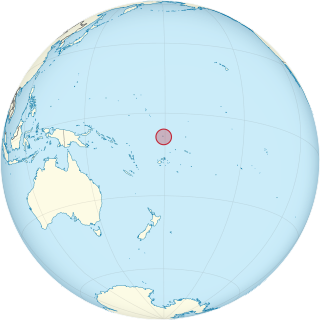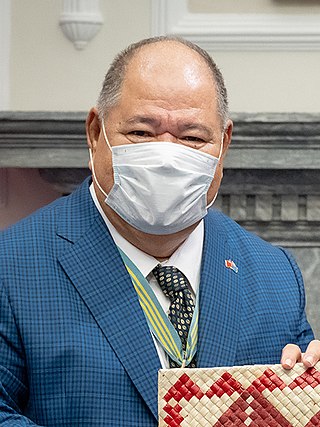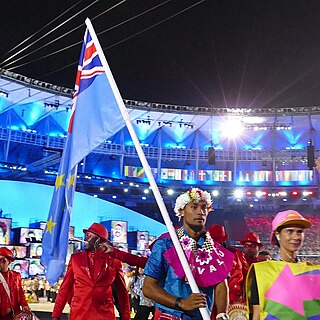
Tuvalu is an island country in the Polynesian subregion of Oceania in the Pacific Ocean, about midway between Hawaii and Australia. It lies east-northeast of the Santa Cruz Islands, northeast of Vanuatu, southeast of Nauru, south of Kiribati, west of Tokelau, northwest of Samoa and Wallis and Futuna, and north of Fiji.

Demographic features of the population of Tuvalu include the age structure, ethnicity, education level, life expectancy, religious affiliations and other aspects of the population.

Tuvalu is a Polynesian island nation located in the Pacific Ocean, midway between Hawaii and Australia, with a population of 11,192 per the 2017 census. The economy of Tuvalu is constrained by its remoteness and lack of economies of scale. Government revenues largely come from fishing licences ; direct grants from international donors ; and income from the Tuvalu Trust Fund. The lease of its highly fortuitous .tv Top Level Domain (TLD) also contributes revenue. The sale of stamps since the independence of Tuvalu in 1976 has been an important source of revenue for the country and government. However, such revenue has significantly declined in recent years. Tuvalu has hardly any tourism. It has no tour guides, tour operators, or organised activities, and no cruise ships visit.

Tuvaluan, often called Tuvalu, is a Polynesian language closely related to the Ellicean group spoken in Tuvalu. It is more or less distantly related to all other Polynesian languages, such as Hawaiian, Māori, Tahitian, Samoan, Tokelauan and Tongan, and most closely related to the languages spoken on the Polynesian Outliers in Micronesia and Northern and Central Melanesia. Tuvaluan has borrowed considerably from Samoan, the language of Christian missionaries in the late 19th and early 20th centuries.

The traditional music of Tuvalu consists of dances, including fatele, fakanau and fakaseasea. The influence of the Samoan missionaries sent to Tuvalu by the London Missionary Society from the 1860s resulted in the suppression of songs about the traditional religions or magic and many songs were lost. As the influence of the missionaries diminished in the 20th century the traditional dances were revived and the siva dance tradition from Samoa also became popular.
Sir Fiatau Penitala Teo was a political figure from the Pacific nation of Tuvalu. Teo was appointed Chief in the House of Chiefs of Niutao in 1945 and was reappointed as a Chief on 29 June 1997 after his service as the first Governor General of Tuvalu.

Bikenibeu Paeniu, PC is a politician from Tuvalu. He represented the constituency of Nukulaelae in the Parliament of Tuvalu. He has served twice as the Prime Minister of Tuvalu, and now serving as Tuvaluan ambassador to Taiwan since June 2022.
The Christian Church of Tuvalu, is a Christian church and is the largest religious denomination in the country. This status entitles it to "the privilege of performing special services on major national events"; its adherents comprise about 86% of the 11,600 inhabitants of the archipelago.
Afaese Manoa is a Tuvaluan writer and musician.

Tuvalu competed at the 2008 Summer Olympics in Beijing, China, from 8 to 24 August 2008. This was the nation's first ever appearance in an Olympic Game. The delegation included two track and field athletes and one weightlifter. Okilani Tinilau and Asenate Manoa participated in athletics while Logona Esau participated in the weightlifting sport. Both track and field athletes achieved national records. Logona Esau led the Tuvaluan squad as the nation's flag bearer in the parade of nations.

The following outline is provided as an overview of and topical guide to Tuvalu:

The monarchy of Tuvalu is a system of government in which a hereditary monarch is the sovereign and head of state of Tuvalu. The current Tuvaluan monarch and head of state since 8 September 2022 is King Charles III. As sovereign, he is the personal embodiment of the Tuvaluan Crown. Although the person of the sovereign is equally shared with 14 other independent countries within the Commonwealth of Nations, each country's monarchy is separate and legally distinct. As a result, the current monarch is officially titled King of Tuvalu and, in this capacity, he and other members of the royal family undertake public and private functions domestically and abroad as representatives of the Tuvaluan state. However, the King is the only member of the royal family with any constitutional role.
Asenate Manoa is a Tuvaluan track and field athlete who represented Tuvalu at the 2008 Summer Olympics, at the 2009 World Championships & 2011 World Championships and at the 2012 Summer Olympics. Manoa represented Tuvalu in the sport of powerlifting at the Pacific Games 2015 and won a bronze medal in the 72 kg Female category. She was the first woman to represent Tuvalu at the Olympics.

Feleti Penitala Teo is a Tuvaluan politician and lawyer who is serving as the 14th prime minister of Tuvalu since 2024. He was elected to the Parliament of Tuvalu in the 2024 Tuvaluan general election, with his previous role being the executive director of the Western and Central Pacific Fisheries Commission (WCPFC).

Kausea Natano is a politician who served as the Prime Minister of Tuvalu from 19 September 2019 to 26 February 2024. He represented Funafuti as a Member of Parliament. He was first elected in the 2002 Tuvaluan general election and served as an MP until he was unseated in the 2024 Tuvaluan general election.

Tuvalu participates in the Olympic Games in the Summer Olympics. It has yet to compete at the Winter Olympics.

Sport is an important part of Tuvaluan culture, which sporting culture is based on traditional games and athletic activities and the adoption of some of the major international sports of the modern era.
The Cabinet of Tuvalu is the executive branch of the government of Tuvalu.

Tuvalu competed at the 2012 Summer Olympics in London, which was held from 27 July to 12 August 2012. The country's participation at London marked its second appearance in the Summer Olympics since its debut at the 2008 Summer Olympics. The delegation consisted of three competitors: two short-distance runners, Tavevele Noa and Asenate Manoa, and one weightlifter, Tuau Lapua Lapua. All three qualified for the games through wildcard places because they did not meet the qualification standards. Lapua was the flag bearer for the opening ceremony while Manoa carried it at the closing ceremony. Noa and Manoa failed to advance beyond the preliminary rounds of their events although the latter established a new national record for the women's 100 metres, while Lapua placed 12th in the men's featherweight weightlifting competition.

Women in Tuvalu continue to maintain a traditional Polynesian culture within a predominantly Christian society. Tuvaluan cultural identity is sustained through an individual's connection to their home island. In the traditional community system in Tuvalu, each family has its own task, or salanga, to perform for the community. The skills of a family are passed on from parents to children. The women of Tuvalu participate in the traditional music of Tuvalu and in the creation of the art of Tuvalu including using cowrie and other shells in traditional handicrafts. There are opportunities of further education and paid employment with non-government organisations (NGOs) and government enterprises, education and health agencies being the primary opportunities for Tuvaluan women.












